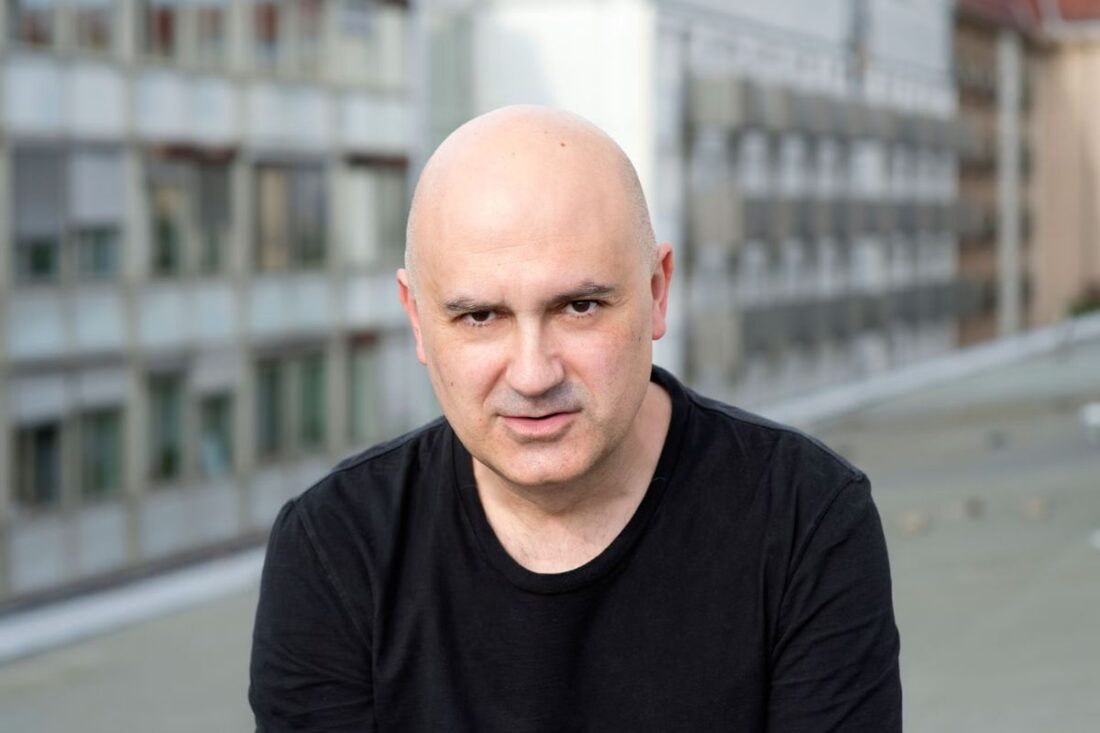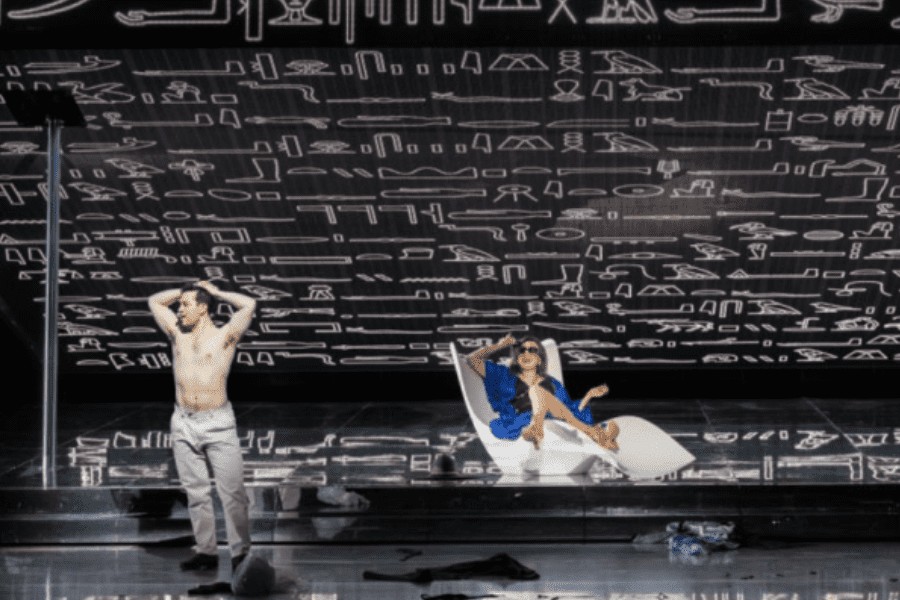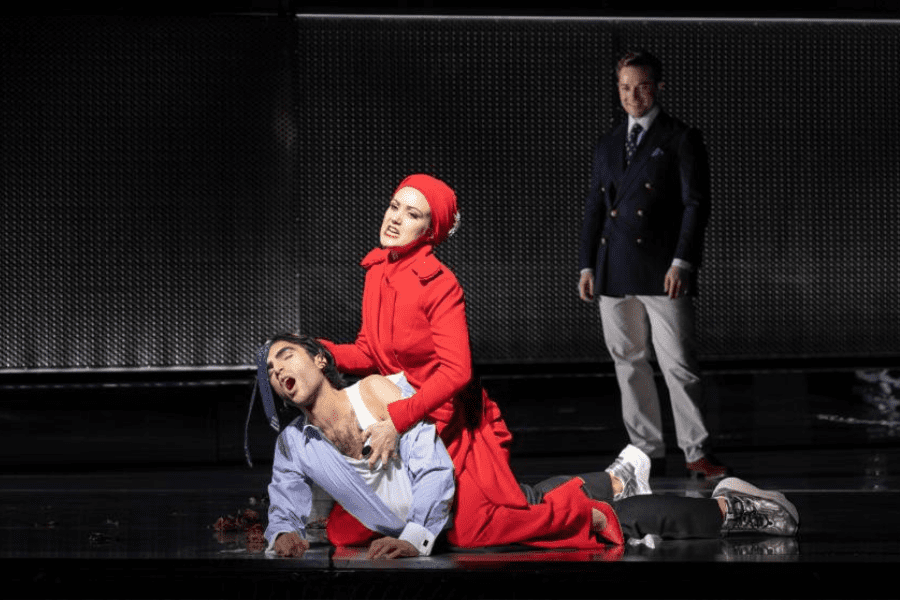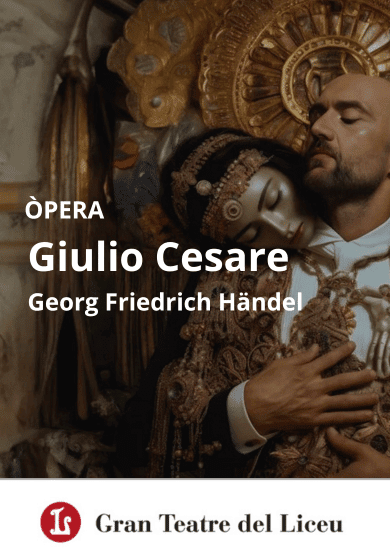
Calixto Bieito: “Baroque opera is like pop”
In ancient Egypt, where the Nile winds between the pyramids and the palat conspiracies, a story of power, seduction and betrayal is born. Giulio cesare in Egitto reborn at the Gran Teatre del Liceu from the innovative perspective of Calixto Bieito, which transforms Handel’s opera into a fresco of human passions that challenge time. The baton of William Christie and the Liceu Orchestra insume new life into the plot while Xavier Sabatathat embodies a fascinating Caesar, and Julie Fuchson the skin of a advertising Cleopatra, they transport us to a universe where glory is based on the tragedy. Bieito, with his audacious vision, places the opera of 1724 in a futuristic environment, with a giant metal cube and digital effects that recreate a desert paradise full of violence, abuse and sex. In this scenario of lights and shadows, reflecting the fragility of power and the triumph of money, we talk with Calixto Bieito about the relentless repetition of history and the symbiosis between music and drama.

What attracted you from this opera to take it on stage, and what do you consider to make it so powerful and timeless?
It’s like a Shakespeare, you know? It has everything it needs: politics, violence, poetry, eroticism … Ambition, all within a context of power tensions in Egypt. It is a universal piece. Like Shakespeare, it always works in any context. In addition, music is wonderful.
It is one of Handel’s best -known operas, both for his musical richness and the psychological depth of the characters. How have you worked on this duality between spectacular and introspection?
I always work very close to the characters, both the singers and the characters themselves in the scene. Some knew them, like Julie Fuchs, with whom I have collaborated many times. This greatly facilitates emotional, physical and intellectual understanding. It’s like a kind of body dramaturgy.
“I like to create shows that are attractive, but without telling the audience what to think.”
How do you play the role of power figures like Cleopatra and Caesar in contemporary society? Is there parallels between their struggles and current political issues?
There are many. But I think it is the audience who has to build bridges; I don’t like to give direct messages. I like to create shows that are attractive, excited and think, but without telling the audience what to think.
Your productions often explore violence and power as mechanisms of domination. How does this violence manifest in ‘Giulio Cesare’?
In this case, violence is more buried, more mental. It is political violence, which can be even more poignant. Politics often resorts to violence, to intellectual and emotional manipulation. It is like a great exhibition where everyone speculates on power, seeing who ends up winning the game. It is a political work full of irony, which is reflected in the triumphant couple and the influence of money. It is the triumph of money; We all want to be millionaires [riu]. It has some irony.
The scenery of Rebecca Ringst recalls a closed, technological and oppressive structure. Have you wanted to suggest an idea of seclusion or control? Is it a way to reflect the internal conflicts of the characters?
Yes, it suggests an idea of seclusion, control and party. It is very inspired by technological elements used in the great cultural exhibitions. Somehow it is a parody. It has a point of irony and obviously refers to virtual reality and image manipulation: “What I see is real, but it is not.” There are two levels: one of mental manipulation and one of real level, which, when closed, can be very oppressive. It ends with a happy ending, because in the end this piece celebrates the money.
Cleopatra is one of the most fascinating characters in opera, full of nuances and contradictions. In your assembly, present it with an image of advertising diva. What is the intention of this representation?
He is a very smart person. He uses advertising to achieve political and seduction goals. Today, with everything you can hack and manipulate, it is impressive. I do not say it thinking that the past was better or worse, but simply I know what the current world is like. I’m sure the future will also have good things. I am not one of the people who believe that everything will be worse.
How did you build the relationship between Caesar and Cleopatra in this version? Have you wanted to emphasize the political or ’emotional dimension more?
The political dimension is very important. Now I have a Julius Caesar Nou, played by Xavier Sabata, and I will surely change some things [riu]. When the cast is new, I adapt the assembly, and the relationship will change. In this case, I think the relationship will be more emotional and at the same time more political on the part of Cleopatra.

Baroque opera allows a lot of freedom in ornaments and variations. Have you encouraged the singers to explore these possibilities or have you opted for a more controlled reading?
No, I always encourage freedom. We live in a world where sometimes I don’t know where freedom is. I am a person who works with the yes and not with the no. If I am wrong, I prefer to make a mistake.
How did you get to see as prominent as those of Xavier Sabata, Julie Fuchs and Teresa Lervolino bring a new emotional dimension to their characters? What elements do you think they have contributed to the dramatic development of the opera?
They are all open, they all act fantastically and sing just as well. It is a real delight.
How do you see the evolution of baroque opera in the current scene? Do you think, despite changes in the taste of the public, does this music still have something important to say to the contemporary audience?
Very very much. I will make a little banal comparison, but I think Baroque music has themes that could be pop. Baroque opera is like pop: it has its own purity and beauty. In addition, it is a great way to get closer to the young audience.

Why do you think many of your creations are not visible in our country?
For example, I directed the War Requiem,,,,,, Benjamin Brittenwhich could be seen in many places. I don’t know, things are like that, many things are lost. I have done a lot of productions because I really like my work, I’m still very excited. I have a good time working, I have a good time with people, and it is a way to connect, to have empathy with people and artists. It is great to be in an essay, with music, text, and let yourself be carried away, flow like water.
When you return to Barcelona, at the Liceu, how do you feel?
It is always special to me. I lived very close when the Liceu was burned, it was my first floor, and this gives it a very personal component. Barcelona is a fundamental place in my life. In fact, I dream of Catalan; I learned to love in Catalan.
More information, pictures and entries:









